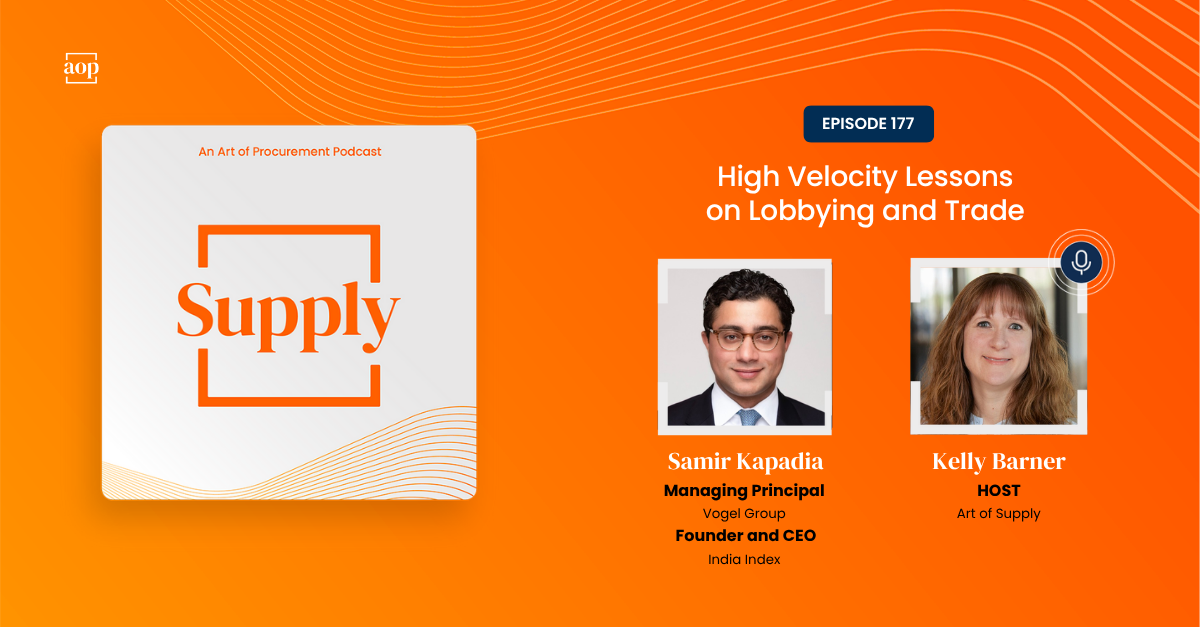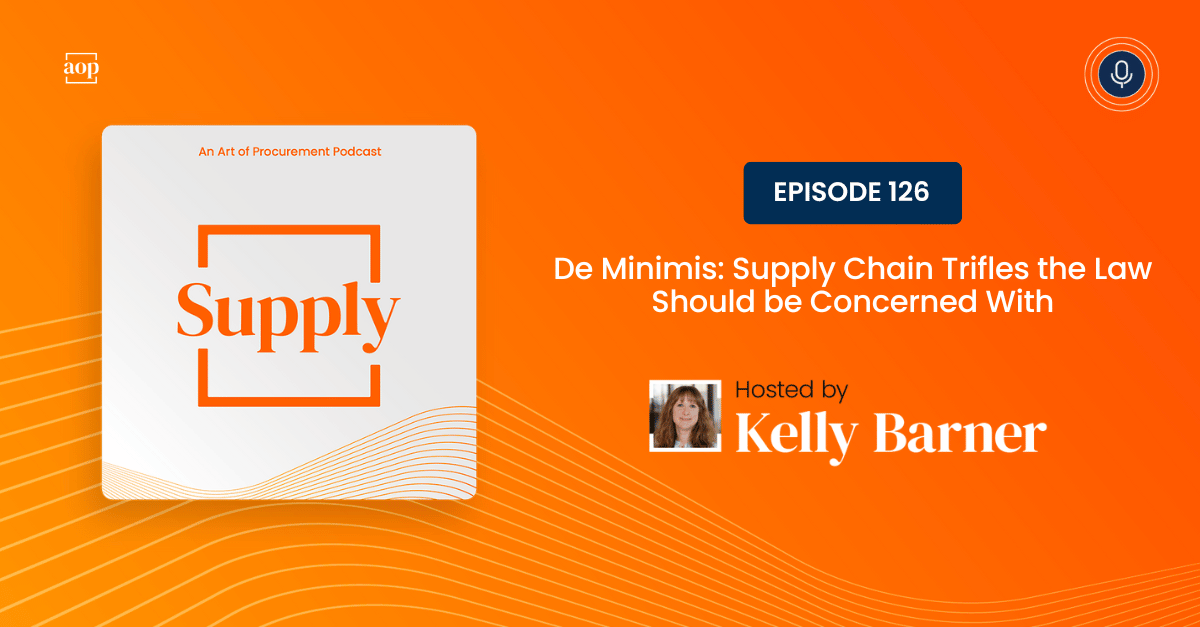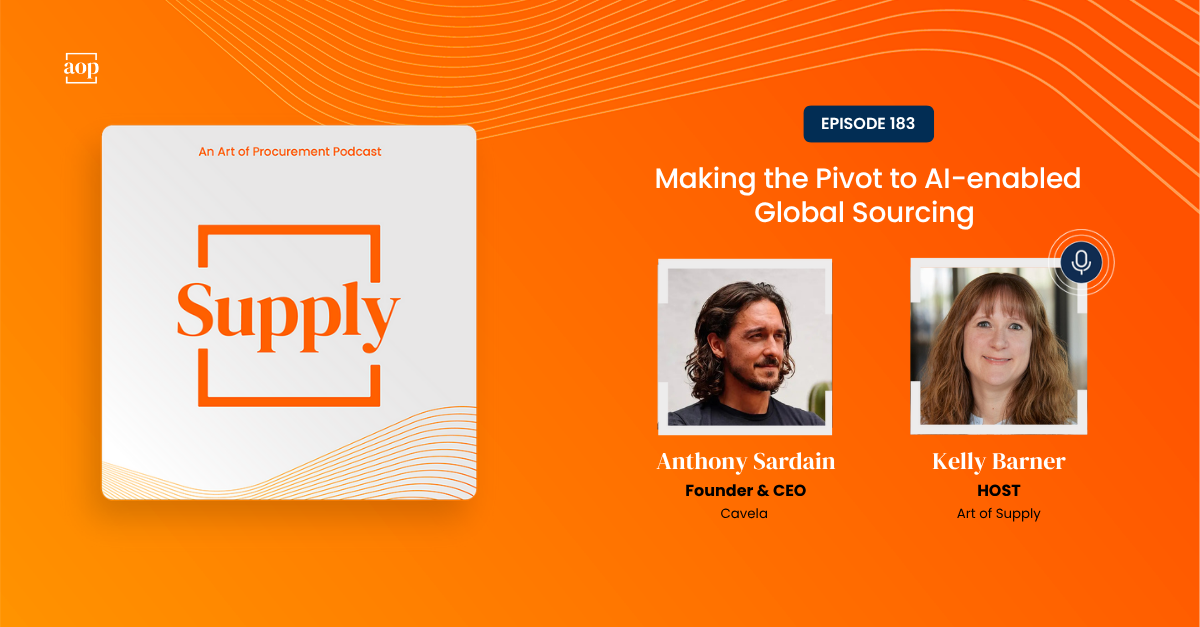
“In this climate of being a trade professional in Washington, expect to be in an Uber for about half of the day and then the other half of it sitting in rooms making cases of why people either should be not paying tariffs or how other people should be paying tariffs.” - Samir Kapadia, Managing Principal at Vogel Group and Founder and CEO at India Index
Supply chain professionals have always had to keep a close eye on trade, but with tariffs launching trade-related topics to the top of the news cycle repeatedly since January, all of us - supply chain professionals and otherwise - have learned something new.
One person who spends a majority of his time right in the thick of it all is Samir Kapadia, Managing Principal at Vogel Group and Founder and CEO at India Index.
Samir and Kelly Barner have discussed global sourcing and tariffs in the past, but in this interview they take a broader approach, exploring how trade policies and lobbying intersect and what they really mean in today's volatile geopolitical environment.
Countries are Strategic About Their Trade Partners
When it comes to who countries choose to do business and strengthen relationships with, Samir explained, they only “affiliate themselves with companies when it serves their advantage.”
To prove his point, he offered a comparison between the independent lobbying of U.S. apparel companies sourcing from countries like Vietnam with the collaborative effort between Nippon Steel and the Japanese government in their attempt to acquire U.S. Steel. “Somehow, [the Nippon Steel deal] got done through the back door because country and company cooperated together,” he said.
When I pressed about the power that individual U.S. states have in lobbying for certain trade policy, Samir revealed that, although states may handle downstream execution, strategic moves remain in federal hands.
“Friend-Shoring” Isn’t Just a Buzzword
Speaking of deals made behind the scenes, Samir pointed out that trade policies and lobbying efforts are influenced by much more than just economic strategy. “Labor rights and environmental standards are core components of trade negotiations,” he said, referencing the United States-Mexico-Canada Agreement (USMCA) within an example he shared.
He went on to explain that the U.S. is increasingly enforcing export restrictions, particularly those that relate to technologies that can impact national security. When we look at chips and semiconductors, Samir was fascinated to see that the United States is closer to closing trade deals with India than it is with Mexico, considering that our two countries share a border.
It prompted him to bring up the fact that the U.S. needs to be honest about what we can and cannot immediately bring into our domestic supply chain. “Sometimes the United States doesn't want to make this stuff. Either we don't have the werewithal, or we don't have the desire. Maybe we lost the skill set. Maybe the economics don't work.”
It will be interesting to see where we ultimately close trade deals as we look to bring global supply chains closer to home.
Lobbying Needs One Key Factor to Succeed
As we got further into the conversation, Samir gave us a basic definition to understand how he and other lobbyists work. “If you’re a company that has a trade issue, you’re paying a tariff you can’t afford, or you’ve got to do layoffs, you hire a lobbyist to go and sit down with the government to make those changes.”
After giving a few examples of how this plays out in real life, he broke down the three kinds of lobbying that impact efforts.
- Access lobbying involves having someone who has an “in” to help you get what you want.
- Expertise lobbying brings in a specialist who knows the inside and out of your industry to help make your case.
- Business lobbying truly understands your business to then argue your side to the government.
One thing that Samir really stressed, outside the different lobbying methods that companies and industries may use, was the importance of having massive empathy when presenting a case. “[The government is] not always going to listen, but they're always going to hear,” he says.
He highlighted the need to be able to communicate the severe economic harm of certain policies or tariffs, the impact on national security, and the domestic scarcity of goods as a way to get the government to understand what you’re going through.
Before we wrapped, he shared a story about a particular trade association individual who calmly explained to a certain government office that a tariff would force them to burn down immense acreages of farmland. That person then accurately told the office that they likely wouldn't want to see that story in the press. Lo and behold, not 24 hours later, the issue was remedied.
Samir’s advice with that in mind? “Be prepared to name and shame the government if they do you wrong. Don't be afraid to be bold, but all through the lens of empathy.”




